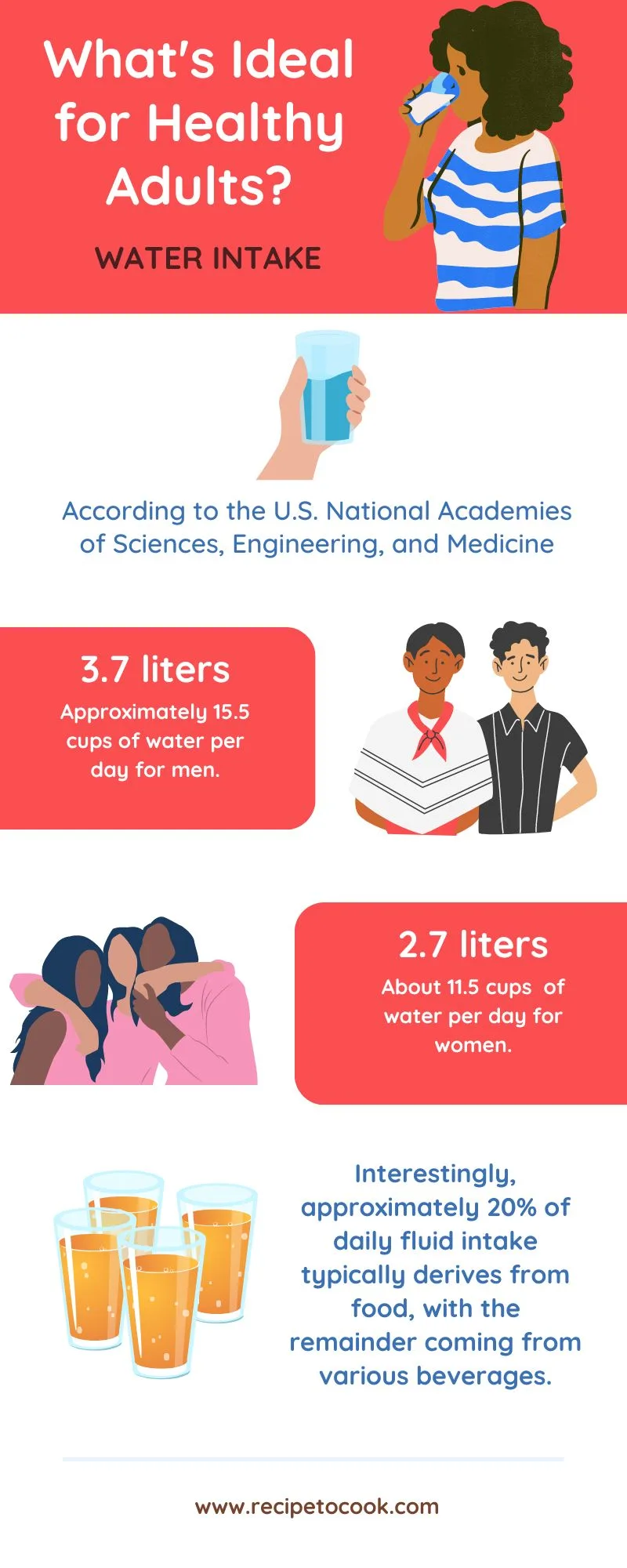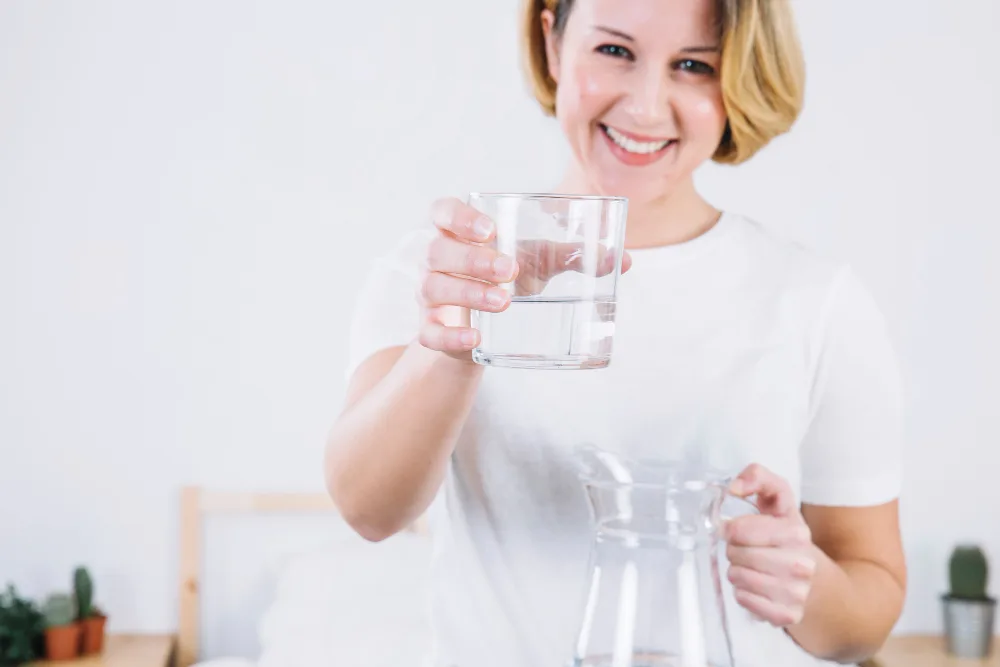Over the years, studies have offered conflicting recommendations, leaving many wondering how much water is truly necessary for optimal health.
The truth is, your individual water requirements are influenced by a multitude of factors, ranging from your overall health status to your level of physical activity and even the climate of your environment. There is no one-size-fits-all approach when it comes to hydration.
However, gaining insights into your body’s unique need for fluids can empower you to make informed decisions about your daily water intake. By delving deeper into the factors that influence hydration, you can better estimate the appropriate amount of water to support your overall well-being.
Understanding your daily water intake
Every day, your body loses water through various processes such as breathing, sweating, urination, and bowel movements. To maintain proper bodily function, it’s crucial to replenish this lost water by consuming fluids from beverages and water-rich foods.
So, how much fluid does the average, healthy adult require, particularly in a temperate climate? Here is the exact answer;
 These guidelines encompass fluids obtained from water, beverages, and food sources. Interestingly, approximately 20% of daily fluid intake typically derives from food, with the remainder coming from various beverages.
These guidelines encompass fluids obtained from water, beverages, and food sources. Interestingly, approximately 20% of daily fluid intake typically derives from food, with the remainder coming from various beverages.
What are the benefits of drinking a lot of water?
Drinking a good amount of water throughout the day offers an extremely great number of benefits that contribute to overall health and well-being. Here are some unique advantages that may not have been extensively covered:
Enhanced cognitive function
Adequate hydration has been linked to improved cognitive performance, including better concentration, alertness, and memory recall. Staying well-hydrated ensures optimal brain function, allowing you to tackle tasks with clarity and efficiency.
Joint lubrication and flexibility
Proper hydration supports the lubrication of joints, which can help reduce friction and discomfort during movement. By maintaining adequate fluid levels, you can promote joint flexibility and minimize the risk of stiffness or injury, particularly during physical activity or exercise.
Improved digestive health
Drinking plenty of water aids in digestion by facilitating the breakdown of food and the absorption of nutrients. It helps to keep the digestive system functioning smoothly, preventing issues such as constipation and promoting regular bowel movements for overall gut health.
Boosted metabolism and weight management
Staying hydrated can rev up your metabolism, making it easier to maintain a healthy weight or support weight loss efforts. Drinking water before meals can help you feel fuller, leading to reduced calorie intake and better appetite control.
Enhanced detoxification
Water plays a crucial role in flushing toxins and waste products out of the body through urine and sweat. By staying adequately hydrated, you support the kidneys and liver in their detoxification processes, promoting overall detoxification and cleansing of the body.
Improved skin health
Adequate hydration can contribute to vibrant, glowing skin by helping to maintain optimal moisture levels. Proper hydration supports skin elasticity, reducing the appearance of wrinkles and fine lines, and promoting a more youthful complexion.
Enhanced exercise performance
Hydration is essential for maintaining physical performance and preventing dehydration-related fatigue during exercise. By replenishing lost fluids through sweating, you can sustain endurance, improve stamina, and optimize your workout performance.

Regulation of body temperature
Water plays a critical role in regulating body temperature, helping to prevent overheating or dehydration during hot weather or intense physical activity. Proper hydration ensures that your body can effectively cool itself through sweating, maintaining a stable internal temperature.
Sufficient water intake in your daily routine can offer a multitude of health benefits, supporting various bodily functions and promoting overall vitality and wellness.
Signs you need to drink more water
Determining whether you’re consuming sufficient fluids can be gauged by several indicators:
- Infrequent sensations of thirst
- Observation of colorless or pale yellow urine
- Seeking guidance from your healthcare provider or nutritionist to establish your daily water requirements.
To prevent dehydration and ensure adequate water intake, prioritize water consumption as your primary choice of beverage. Incorporate the following habits into your daily routine:
- Enjoy a glass of water alongside each meal and during intervals between meals.
- Consume water before, during, and after engaging in physical activity or exercise.
- Listen to your body’s cues and drink water whenever you feel thirsty.
Test your hydration level
By reading the 3/4 portion of this article, you may thought of testing your water hydration level. No worries, Here is a tool to calculate your water intake level.
The fact behind drinking 8 glasses of water a day
The recommendation to drink 8 glasses of water a day, often cited as a standard guideline for hydration, has been popularized over the years. However, it’s important to note that this specific quantity is not based on scientific evidence or standardized guidelines. Instead, hydration needs vary depending on factors such as age, lifestyle, weight, activity level, climate, and overall health status.
While staying adequately hydrated is crucial for overall well-being, the exact amount of water needed can vary significantly from person to person. Some individuals may require more than 8 glasses of water a day, while others may need less.
It’s also worth mentioning that water intake can come from a variety of sources, including beverages like water, morning tea, and milk, as well as water-rich foods like fruits and vegetables.
Ultimately, the key is to listen to your body’s signals of thirst and ensure that you drink enough fluids to maintain proper hydration levels.
